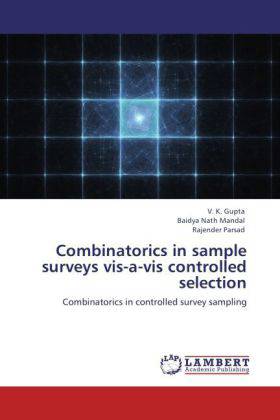
- Afhalen na 1 uur in een winkel met voorraad
- Gratis thuislevering in België vanaf € 30
- Ruim aanbod met 7 miljoen producten
- Afhalen na 1 uur in een winkel met voorraad
- Gratis thuislevering in België vanaf € 30
- Ruim aanbod met 7 miljoen producten
Zoeken
Combinatorics in sample surveys vis-a-vis controlled selection
Combinatorics in controlled survey sampling
V. K. Gupta, Baidya Nath Mandal, Rajender Parsad
Paperback | Engels
€ 98,45
+ 196 punten
Omschrijving
This book is concerned with the applications of combinatorics to survey sampling with special reference to controlled sampling. The use of combinatorics helps in obtaining sampling designs which exercise control on sample selection. The book begins with preliminaries of sample surveys and in the end gives appendices which describe the concepts of experimental designs for the benefit of the readers. Some controlled sampling designs generated and the SAS codes for generation of sampling designs are also given in these appendices. The main chapters of the book focus on the applications of binary incomplete block designs, linear programming and linear integer programming for generation of controlled sampling designs both for equal and unequal probability sample selection. The book also covers applications of Hadamard matrices, mixed orthogonal arrays and proportional frequency plans in variance estimation from a large scale complex survey data. The book meets the requirements of the master's level students in Statistics with interest in theory of sample surveys and design of experiments while some portions may be found useful for research scholars and consulting statisticians.
Specificaties
Betrokkenen
- Auteur(s):
- Uitgeverij:
Inhoud
- Aantal bladzijden:
- 360
- Taal:
- Engels
Eigenschappen
- Productcode (EAN):
- 9783846543580
- Verschijningsdatum:
- 13/06/2012
- Uitvoering:
- Paperback
- Afmetingen:
- 152 mm x 229 mm
- Gewicht:
- 526 g

Alleen bij Standaard Boekhandel
+ 196 punten op je klantenkaart van Standaard Boekhandel
Beoordelingen
We publiceren alleen reviews die voldoen aan de voorwaarden voor reviews. Bekijk onze voorwaarden voor reviews.







